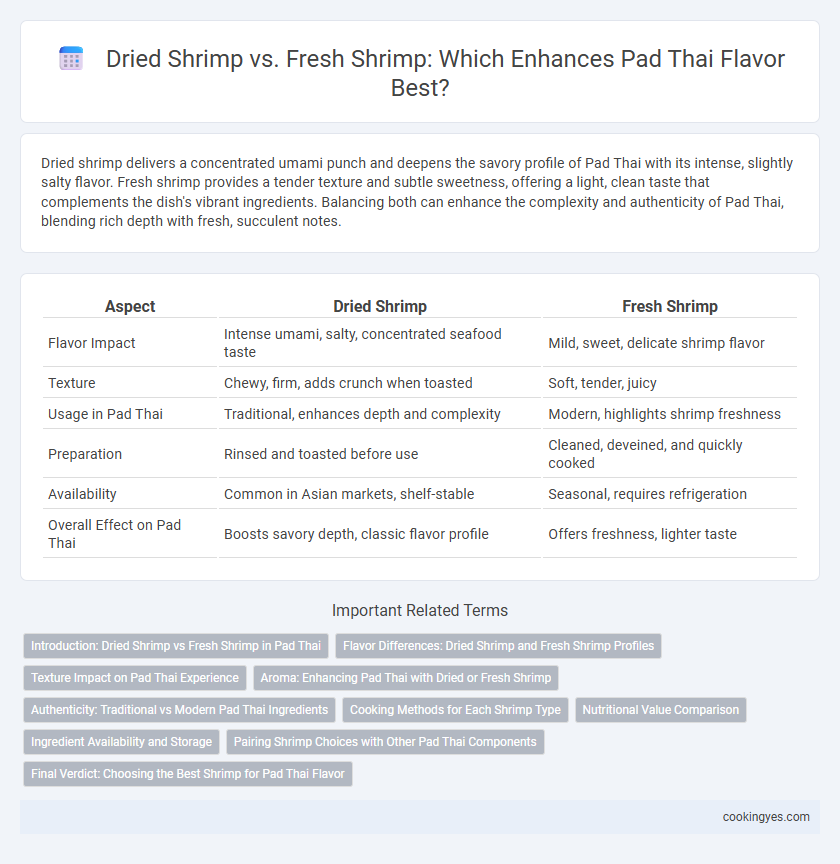Dried shrimp delivers a concentrated umami punch and deepens the savory profile of Pad Thai with its intense, slightly salty flavor. Fresh shrimp provides a tender texture and subtle sweetness, offering a light, clean taste that complements the dish's vibrant ingredients. Balancing both can enhance the complexity and authenticity of Pad Thai, blending rich depth with fresh, succulent notes.
Table of Comparison
| Aspect | Dried Shrimp | Fresh Shrimp |
|---|---|---|
| Flavor Impact | Intense umami, salty, concentrated seafood taste | Mild, sweet, delicate shrimp flavor |
| Texture | Chewy, firm, adds crunch when toasted | Soft, tender, juicy |
| Usage in Pad Thai | Traditional, enhances depth and complexity | Modern, highlights shrimp freshness |
| Preparation | Rinsed and toasted before use | Cleaned, deveined, and quickly cooked |
| Availability | Common in Asian markets, shelf-stable | Seasonal, requires refrigeration |
| Overall Effect on Pad Thai | Boosts savory depth, classic flavor profile | Offers freshness, lighter taste |
Introduction: Dried Shrimp vs Fresh Shrimp in Pad Thai
Dried shrimp offers a concentrated umami flavor and a chewy texture that enhances the traditional taste of Pad Thai, contributing a distinctive savory depth. Fresh shrimp provides a tender, juicy bite with a milder seafood essence, creating a lighter and fresher profile in the dish. Choosing between dried and fresh shrimp significantly influences the overall flavor complexity and authenticity of Pad Thai.
Flavor Differences: Dried Shrimp and Fresh Shrimp Profiles
Dried shrimp contribute a concentrated umami flavor and a slightly chewy texture that enhances Pad Thai's savory depth and complexity. Fresh shrimp offers a tender, juicy bite with a naturally sweet and mild seafood taste, providing a lighter and fresher flavor profile. Choosing dried shrimp intensifies the dish's traditional richness, while fresh shrimp delivers a more delicate and subtle seafood essence.
Texture Impact on Pad Thai Experience
Dried shrimp offers a concentrated umami punch and a firm, chewy texture that enhances the authentic Pad Thai experience by adding complexity and depth to each bite. Fresh shrimp provides a tender, juicy consistency that delivers a delicate seafood flavor, creating a lighter texture contrast with the stir-fried noodles and crunchy peanuts. The choice between dried and fresh shrimp significantly influences Pad Thai's mouthfeel, balancing chewiness and freshness to tailor the dish to personal taste preferences.
Aroma: Enhancing Pad Thai with Dried or Fresh Shrimp
Dried shrimp infuse Pad Thai with a concentrated umami aroma, lending a deep, savory richness that intensifies the dish's traditional flavor profile. Fresh shrimp contribute a subtle, briny fragrance that highlights the natural sweetness of seafood without overpowering other ingredients. Balancing dried shrimp's pungent aroma and fresh shrimp's delicate scent can elevate Pad Thai's complexity and overall sensory appeal.
Authenticity: Traditional vs Modern Pad Thai Ingredients
Dried shrimp deliver a concentrated umami flavor essential to traditional Pad Thai, preserving the authentic taste rooted in Thai culinary heritage. Fresh shrimp offers a milder, more delicate seafood profile, favored in modern adaptations seeking a fresher, less pungent flavor. Choosing between dried and fresh shrimp thus influences the dish's authenticity, balancing classic richness against contemporary preference.
Cooking Methods for Each Shrimp Type
Dried shrimp impart a concentrated umami flavor and are best soaked before use to rehydrate and soften their texture, making them ideal for stir-frying in Pad Thai for deep, savory notes. Fresh shrimp offer a delicate sweetness and tender bite, requiring quick cooking in high heat to preserve their moisture and enhance the dish's freshness. Balancing the choice of shrimp with proper cooking techniques ensures authentic Pad Thai flavor and texture.
Nutritional Value Comparison
Dried shrimp used in Pad Thai offers a concentrated source of protein, calcium, and iodine, enhancing both flavor complexity and nutritional density. Fresh shrimp provides a higher moisture content and is richer in vitamin B12 and omega-3 fatty acids, supporting cardiovascular health. Choosing between dried and fresh shrimp depends on whether the focus is on intense umami taste with mineral benefits or on fresh seafood nutrients and texture.
Ingredient Availability and Storage
Dried shrimp offers a concentrated umami flavor essential for authentic Pad Thai, with a long shelf life and easy storage at room temperature, making it convenient for infrequent use. Fresh shrimp provides a tender texture and delicate taste but requires refrigeration and quick consumption to maintain quality, limiting its availability and storage time. Choosing between dried and fresh shrimp depends on balancing flavor intensity with ingredient accessibility and proper storage conditions.
Pairing Shrimp Choices with Other Pad Thai Components
Dried shrimp in Pad Thai intensifies umami notes and pairs exceptionally well with tamarind paste and crushed peanuts, enhancing the dish's signature tangy and crunchy texture. Fresh shrimp offers a delicate sweetness and tender bite, balancing the salty, sweet, and sour flavors from fish sauce, palm sugar, and lime juice. Choosing dried or fresh shrimp influences the harmony between protein and rice noodles, bean sprouts, and scallions, creating either a robust or subtle taste profile.
Final Verdict: Choosing the Best Shrimp for Pad Thai Flavor
Dried shrimp imparts a concentrated umami and salty depth that enhances the traditional Pad Thai profile with an authentic, robust flavor. Fresh shrimp offers a tender, sweet, and slightly briny taste that adds a delicate seafood freshness while maintaining a chewy texture. For a classic Pad Thai experience, incorporating dried shrimp is preferred for its intense flavor boost, but fresh shrimp can be used to achieve a lighter, subtler taste preferred by some cooks.
Dried shrimp vs Fresh shrimp for Pad Thai flavor Infographic

 cookingyes.com
cookingyes.com